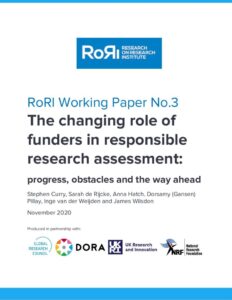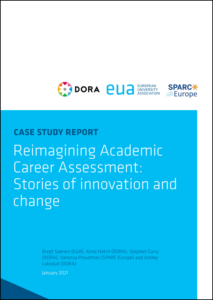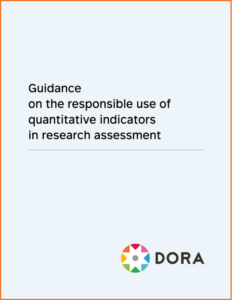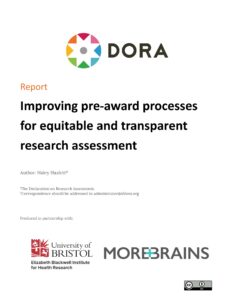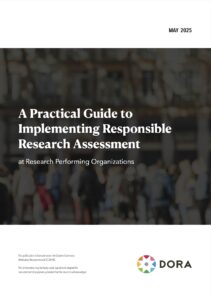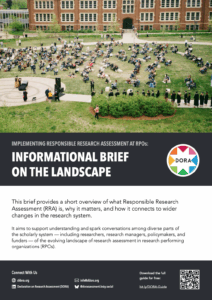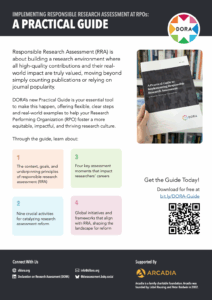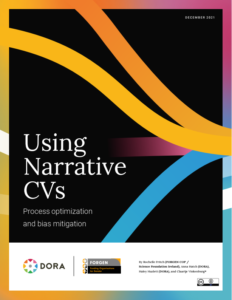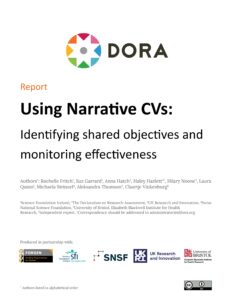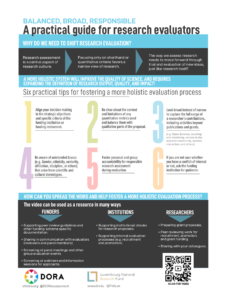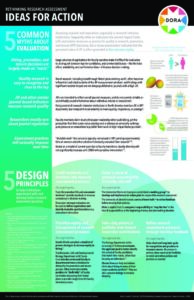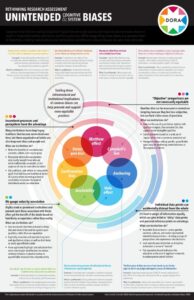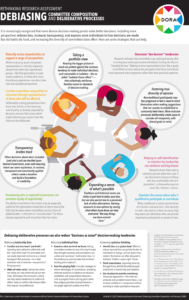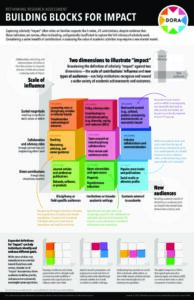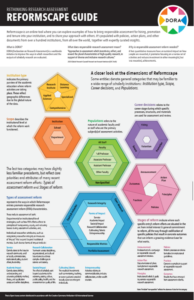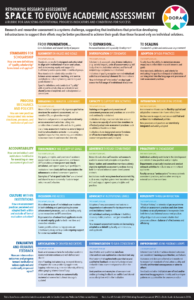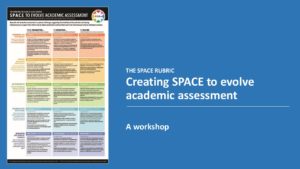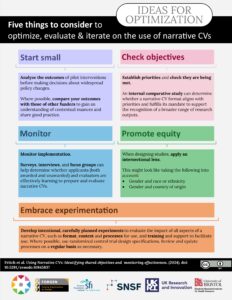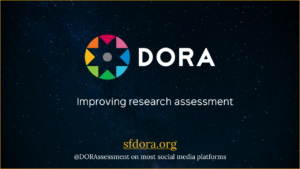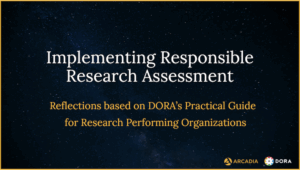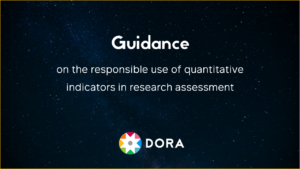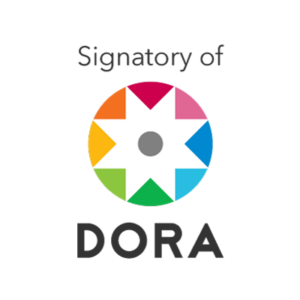Reports, guidance, position papers
The changing role of funders in responsible research assessment: progress, obstacles and the way ahead
Position paper on the state of play of responsible research assessment practices from funders. 2020.
Reimagining Academic Career Assessment: Stories of innovation and change report
This report collects case studies in institutional change for academic career assessment that serve as inspiration for universities and other actors looking to improve their policies and practices. Supports the DORA case study repository. 2021.
Guidance on the responsible use of quantitative indicators in research assessment
This document provides guidance on the use of several indicators (sometimes called metrics) used in research assessment: the Journal Impact Factor and other measurements of journals, citation counts, h-index, field-normalized citation indicators, and altmetrics. Five principles guide the use of these metrics: be clear, be transparent, be specific, be contextual, and be fair. Also available on Zenodo and Google Docs. A summary slide deck is also available. 2024.
Improving pre-award processes for equitable and transparent research assessment
This report summarizes key takeaways from a workshop co-organized by DORA, the Elizabeth Blackwell Institute for Health Research, and the MoreBrains Cooperative. The online workshop developed actions to improve the processes that take place before research is submitted for funding (pre-award processes), such as the timing of proposal calls and deadlines, transparency and guidance, phrasing and language use, selection and training of reviewers, and planning for “evaluating the evaluators” or “evaluating the evaluation process.” Also available on Zenodo. 2024.
Practical Guide for Research Performing Organizations
A Practical Guide to Implementing Responsible Research Assessment at Research Performing Organizations
This practical guide provides action-oriented guidance, resources, and illustrative examples, for research performing organizations (RPOs) who are looking to shape and deliver responsible research assessment (RRA) practices. Learn about the context, goals, and underpinning principles of RRA; nine crucial activities for catalyzing research assessment reform; four key assessment moments that impact researchers’ careers; and global initiatives and frameworks that align with RRA, helping you explore the landscape for reform. Also available on Zenodo. Part of Project TARA. 2025.
Implementing Responsible Research Assessment at RPOs: Informational Briefs from the Practical Guide
These three informational briefs offer concise, audience-specific insights and action points to help catalyze change across different roles and levels of responsibility. The three briefs are: Informational Brief on the Landscape; Informational Brief for Leadership; Informational Brief for RRA Task Forces. The briefs complement the full Practical Guide for RPOs. Available on Zenodo. Part of Project TARA. 2025.
Implementing Responsible Research Assessment at RPOs: Quick-Reference Sheets from the Practical Guide
Eight one-pagers distill key insights from the full Practical Guide for RPOs, offering clear summaries, suggested interventions, and illustrative examples across several core areas of assessment reform. Topics are the same as the Guide, including key activities for developing an RRA strategy and key moments in research and researcher assessment. Available on Zenodo. Part of Project TARA. 2025.
“Using Narrative CVs” series
Using Narrative CVs: Process optimization and bias mitigation
This report consolidates key learnings from a workshop on the adoption of narrative CVs for funding organizations. 2021.
Using Narrative CVs: Identifying shared objectives and monitoring effectiveness
This report outlines recommend three key actions to move forward in the implementation of narrative CVs from narrative CV workshops. 2024.
Tools
Balanced, broad, responsible: A practical guide for research evaluators
One page tool for research funders promoting a more holistic approach to evaluating funding proposals. See also the supporting video. 2022.
“Rethinking research assessment” series
Rethinking Research Assessment: Ideas for Action
One page tool that outlines five common myths about research evaluation to help universities better understand barriers to change and provides analogous examples to illustrate how these myths exist inside and outside of academia. 2020.
Rethinking Research Assessment: Unintended Cognitive and Systems Biases
One page tool that identifies seven personal biases that can influence hiring, promotion, and tenure decisions. 2020.
Rethinking Research Assessment: Debiasing Committee Composition and Deliberative Processes
One page tool that identifies strategies for including more perspectives and reducing biases in the evaluation processes for hiring, promotion, tenure, and funding decisions. Part of Project TARA. 2022.
Rethinking Research Assessment: Building Blocks for Impact
One page tool that outlines and illustrates the wide variety of academic achievements and outcomes that could be considered “impactful.” Part of Project TARA. 2022.
Rethinking Research Assessment: Reformscape Guide
A one page tool that illustrates how data is categorized in the Reformscape observatory of responsible research assessment reform policies. It provides a visual alternative to the description of categories in the Reformscape glossary. Part of Project TARA. Also available on Zenodo. 2024.
SPACE rubric
SPACE to evolve academic assessment: A rubric for analyzing institutional conditions and progress indicators
The SPACE rubric was developed to help institutions at any stage of academic assessment reform gauge their institutional ability to support interventions and set them up for success. 2021.
SPACE rubric workbook and workshop kit
A compilation of resources to run a workshop. Includes a slide deck, pre-work, pre-worksheet, reading, breakout room facilitator instructions, and workbook. Several parts available in Spanish. 2021.
Narrative CVs
Ideas for Optimization: Five things to consider to optimize, evaluate and iterate on the use of narrative CVs
One page tool outlines ideas for research funders to optimize, evaluate and iterate on the use of narrative CVs for funding decisions. Supports report, “Using Narrative CVs: Identifying shared objectives and monitoring effectiveness.” 2024.
Slides and graphics
“Introduction to DORA” PowerPoint Slide Decks
Three presentations (one slide, short talk, long talk) describing DORA and its mission. Updated regularly.
“Introduction to the Practical Guide for RPOs” Slide Decks
Three slide decks support the introduction of the Practical Guide for Research Performing Organizations.
“Guidance on the Responsible Use of Quantitative Indicators in Research Assessment” Summary
A presentation describing the main points of DORA’s guidance in indicators. 2024.
DORA Badges
The badges for our signatories show support for DORA, raise awareness about research assessment, and serve as a conversation starter with individuals or organizations that have not heard about DORA yet.


